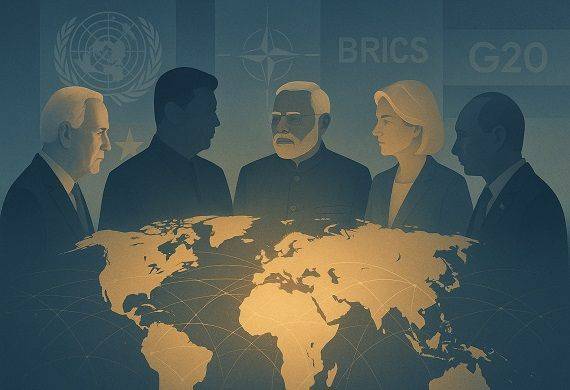Pragmatic Diplomacy: How 2025 Is Redefining Global Alliances
By Ajay Sunny, Correspondent at Global Leaders Insights

Pragmatic Diplomacy: How 2025 Is Redefining Global Alliances
In 2025, diplomacy has entered a tougher, more calculated phase. The familiar alliances of the post–Cold War era are giving way to a world guided less by ideology and more by self-interest. Today, nations see alliances as practical tools, useful when they serve a purpose, disposable when they don’t.
From Commitment to Calculation
For decades, blocs like NATO, BRICS, and the European Union were built on shared values and political ideals. That era is fading. Governments are now treating partnerships as flexible arrangements, ones they can strengthen, reshape, or step back from depending on their needs.
At the 2025 NATO Summit in The Hague, leaders reaffirmed their mutual defense pledge but focused on readiness and resilience, not rhetoric. A new target of 5% of GDP for defense spending highlighted Europe’s shift toward building stronger industries and logistics networks. As NATO Secretary General Mark Rutte described the outcome, it would lay the foundation for a "stronger, fairer and more lethal Alliance." The message was clear: cooperate where needed, stay autonomous where possible.
Similarly, at the EU–Central Asia Summit in Samarkand, Brussels announced a $13 billion investment package aimed at trade, energy, and transport, signaling that economics, not ideology, now drive engagement. European Commission President Ursula von der Leyen emphasized the shift, stating, "In an uncertain world, we send a clear and powerful message: we are partners of choice, and we can rely on each other." Across capitals, moral appeals are giving way to strategic reasoning.
Also Read: Elon Musk's America Party: Key Policies, Vision & How it Differs from Trump's GOP
Strategic Flexibility and Selective Partnerships
Pragmatic diplomacy has made the global order fluid. Nations now form short-term coalitions around specific goals instead of long-term ideological alliances.
South Korea’s “case-by-case diplomacy,” led by President Lee Jae-myung, is a prime example. Seoul manages its ties with both Washington and Beijing based purely on what benefits its national interests, avoiding rigid commitments to either side. In his inaugural address, Lee framed this approach as “practical diplomacy centered on national interest,” underscoring a departure from value-driven alignments.
India has mastered this balancing act. It maintains defense cooperation with Russia, expands trade with the U.S., and engages China through BRICS, all while positioning itself as a voice for the Global South. Prime Minister Narendra Modi has captured this essence, noting that for India, "it is a reality check that the country must broaden its options and avoid dependence on any single power, however close the rhetoric of friendship may sound." The goal is diversification, not dependence.
The Shanghai Cooperation Organisation (SCO) reflects this trend as well. With new members like Saudi Arabia, Egypt, and Turkey, its focus on connectivity and development highlights how issue-based collaboration is replacing ideological unity.
Redefining Old Alliances
Even long-standing alliances are evolving. NATO’s emphasis has shifted from symbolism to substance, prioritizing defense production, supply chains, and technology sharing.
BRICS, meanwhile, faces growing strain. Competing interests, Brazil’s economic focus, India’s security priorities, and Russia’s geopolitical isolation are testing the limits of broad-based cooperation.
Economic diplomacy is now the new battleground. The EU’s outreach to Central Asia, Japan’s Indo-Pacific investments, and the U.S. friend-shoring strategy all point to one reality: trade and technology have overtaken ideology as the true markers of global influence. The world is moving from defense pacts to development pacts.
The Risks of a Transactional World
Pragmatism offers flexibility but comes with fragility. Alliances built on convenience can collapse just as quickly when interests diverge. Without shared values, trust becomes harder to maintain.
Experts warn that these shifting partnerships could breed instability. Short-term deals may weaken long-term cooperation on issues like climate change, health, and arms control. Overlapping regional frameworks could also complicate crisis management in flashpoints such as Ukraine, the Taiwan Strait, or the South China Sea.
The Emerging Global Order
World leaders seem comfortable with this new realism. The upcoming G20 Summit in Johannesburg is expected to reflect this pragmatic tone, prioritizing practical cooperation over unity slogans. South African President Cyril Ramaphosa has set the stage, declaring that "we will put Africa's development at the top of the agenda when we host the G20 in 2025." Economic and technological diplomacy will dominate the agenda.
For smaller nations, flexibility has become a survival strategy. Many countries in Africa and Southeast Asia are engaging multiple partners at once to secure investment, trade, and infrastructure support. They seek options, not allegiance.
Technology as the New Currency of Power
Technology and investment have replaced ideology as the core of influence. Agreements now focus on semiconductors, green energy, digital infrastructure, and data governance instead of territorial defense.
AI regulation, cybersecurity, and access to critical minerals are shaping new forms of collaboration — even between rival powers. These “functional alliances” show that when interests align, competition can coexist with cooperation.
Also Read: How NVIDIA and Jensen Huang Are Leading the Global AI Revolution
Looking Ahead
As 2025 comes to an end, the global diplomatic map is being redrawn. Power now flows more from economic strength and technological leadership than from military might. Values still matter, but they no longer define alignment. Diplomacy today is a marketplace of interests, not a community of ideologies.
The question is whether this pragmatic model can maintain stability. Flexible partnerships may prevent confrontation but lack the unity needed to face global crises. The same realism that encourages balance can also fuel fragmentation.
For now, pragmatic diplomacy is the new norm. Nations behave less like allies and more like negotiators, calculating, adapting, and repositioning. In 2025, alliances are not marriages; they’re contracts. And every contract, as the world keeps learning, can always be renegotiated.
.jpg)



